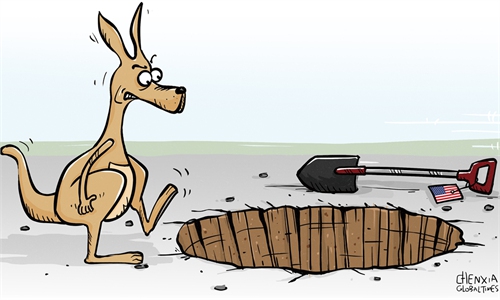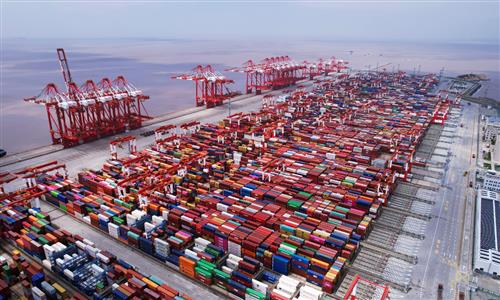
US Secretary of Defense Lloyd Austin speaks at US Navy Central Command headquarters in Manama, Bahrain, on Tuesday. Photo: VCG
On December 18, US Secretary of Defense Lloyd Austin announced in Bahrain that the US, along with several other countries, will conduct joint patrols in the southern Red Sea and the Gulf of Aden. This move comes after Houthi militants in Yemen have frequently used missiles and drones to target Israel and US military bases since the outbreak of the recent Palestine-Israel conflict. Recently, they have also attacked Israel-linked vessels in the Red Sea, causing partial disruption to maritime traffic in the region. The US is facing significant pressure, and Austin stated that "this is an international challenge that demands collective action." For Washington, which has consistently emphasized its "dominant position" in the Middle East, such a stance is an attempt to give itself an out.
The Red Sea is one of the world's most critical transportation channels for energy and industrial products, with approximately 20,000 ships passing through the Red Sea and the Suez Canal into the Mediterranean Sea each year. If this route continues to be blocked, vessels will be forced to detour southward around the Cape of Good Hope, resulting not only in extended transportation times but also significant increases in fuel costs and insurance premiums. This will impact the still fragile global supply chain. In 2021, the grounding of the "Ever Given" container ship in the Suez Canal led to estimated global trade losses ranging from $6 billion to $10 billion per week. Currently, four major European shipping giants have successively announced the suspension of passage through the Red Sea. If the crisis continues, the losses inflicted upon global shipping and the world economy will undoubtedly be substantial.
The interests involved in Red Sea shipping are so extensive that it is not wrong to characterize the current issues facing the Red Sea as an "international challenge." Therefore, the thinking and approach to solving these issues cannot be unilateral, one-way, or simplistic. Houthi forces claimed that their position was not subject to negotiation until Israel ceases military operations in Gaza and allows humanitarian aid to enter. Analysts widely believe the situation in the Red Sea reflects the butterfly effect in the realm of international politics and economics, with Houthi attacks on commercial ships being a manifestation of the spillover effects of the ongoing Palestine-Israel conflict. This once again confirms that in the era of globalization, no local conflict can truly be contained within its "local" boundaries.
As of December 19, the Palestine-Israel conflict has been ongoing for 74 days and there is still no sign of peace in sight. Bypassing a ceasefire and peace process in Israel and Palestine, making technical arrangements and responses to mitigate spillover events, ultimately addresses symptoms rather than the root cause. In fact, achieving even symptomatic relief proves to be challenging.
The Economist, a British magazine, also pointed out in an article on the December 16 that as "the Houthis have demonstrated that a few drones and missiles can always get through," Western countries do not have better measures to cope with the situation. Not to mention, the warships of Western powers in that area may also accidentally fire, leading to a larger storm in the Middle East.
It is worth noting that this joint operation, called "Operation Prosperity Guardian," led by the US military, involves nine countries including the UK, Bahrain, Canada, France, and Italy. It is easy to see that there are few countries from the Middle East region participating, and most of these countries are quite cautious about it. According to reports, Egypt, a strong naval power in the Middle East, as well as Saudi Arabia, Qatar, Oman, and other countries did not participate in this operation. Several other countries agreed to participate but did not want to publicly disclose it. This also indirectly indicates that regional countries have concerns and worries about the joint operation potentially escalating conflicts or undermining the reconciliation process in the Middle East.
The geopolitics of the Middle East are extremely complex, and any small action can have far-reaching consequences. The US has initiated numerous wars and instigated many riots in this region, and has also suffered many setbacks and paid a high price. It has enough experience in dealing with Middle East issues, but it is now increasingly at a loss and trapped in a dilemma of solving one problem only to find another cropping up. The root cause is that the US has never taken a fair stance, nor has it taken into consideration interests of the Middle Eastern countries, but rather approaches the Middle East issue based on its own hegemonic needs. It wants strategic contraction, yet still attempts to maintain its "dominant position" in the region. It does not want to deeply involve itself in regional conflicts, but still plays the tactics of "bolster one and bash the other" to form small interest circles. Such an approach will inevitably only escalate, rather than calm, the turmoil in the region.
Since the US recognizes that resolving the Red Sea crisis requires a "collective action," the international community's stance on the fundamental Palestine-Israel issue is very clear. The UN General Assembly has clearly expressed this through two overwhelming votes, which call for an immediate humanitarian ceasefire. The US cannot stand against the international community and demand its cooperation. To avoid further escalation of the spillover effects of the Palestine-Israel conflict, the key is to return to the fundamental position of peacefully resolving the issue. Specifically, to defuse the "alert" in the Red Sea, there is probably no better choice than genuinely promoting a Palestine-Israel ceasefire.



